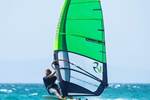Sicomin resins used in Olympic windsurfing board construction
Windsurfers at the Paris 2024 Olympics are competing on composite boards manufactured by Cobra International using Sicomin SR1280 resins.
Sicomin (Châteauneuf les Martigues, France), a formulator and supplier of high-performance epoxy resins, announces that its SR1280 resins are incorporated in the equipment being used at this summer’s Olympic windsurfing events. All windsurfers are competing on identical one-design boards that are made by Cobra International (Chonburi, Thailand) using Sicomin’s SR1280 resin system.
The Cobra windsurfing board has a PVC, carbon and glass fiber sandwich construction that is vacuum molded with SR1280 resin over an EPS foam core. Cobra is the only manufacturer allowed to produce these one-design boards and, according to Sicomin, it demands absolute consistency in the performance and handling characteristics of the epoxy resins supplied.
Sicomin SR1280 is a low-viscosity, CMR-free epoxy resin system optimized for the wet-out of reinforcement fibers. Its range of hardener speeds enable Cobra to fine tune the production and maintain the conformity of each board made. SR1280 is also DNV-GL certified, which provides additional third-party assurance of the product’s quality, performance and consistency.
“We are proud to see our SR1280 resins powering the boards at the Olympics this year, and it will be amazing to see them race so close to our HQ and factory,” says Marc Denjean, global sales manager for Sicomin. “In selecting our SR1280 materials for its Olympic-level equipment, Cobra has confirmed our ongoing commitment to deliver the highest quality and technical consistency that enables them to build these high performance, one-design race boards.”
The Olympic windsurfing events begin in Marseilles, France, on July, 28, 2024.
Related Content
-
Plant tour: Joby Aviation, Marina, Calif., U.S.
As the advanced air mobility market begins to take shape, market leader Joby Aviation works to industrialize composites manufacturing for its first-generation, composites-intensive, all-electric air taxi.
-
Manufacturing the MFFD thermoplastic composite fuselage
Demonstrator’s upper, lower shells and assembly prove materials and new processes for lighter, cheaper and more sustainable high-rate future aircraft.
-
Sulapac introduces Sulapac Flow 1.7 to replace PLA, ABS and PP in FDM, FGF
Available as filament and granules for extrusion, new wood composite matches properties yet is compostable, eliminates microplastics and reduces carbon footprint.















